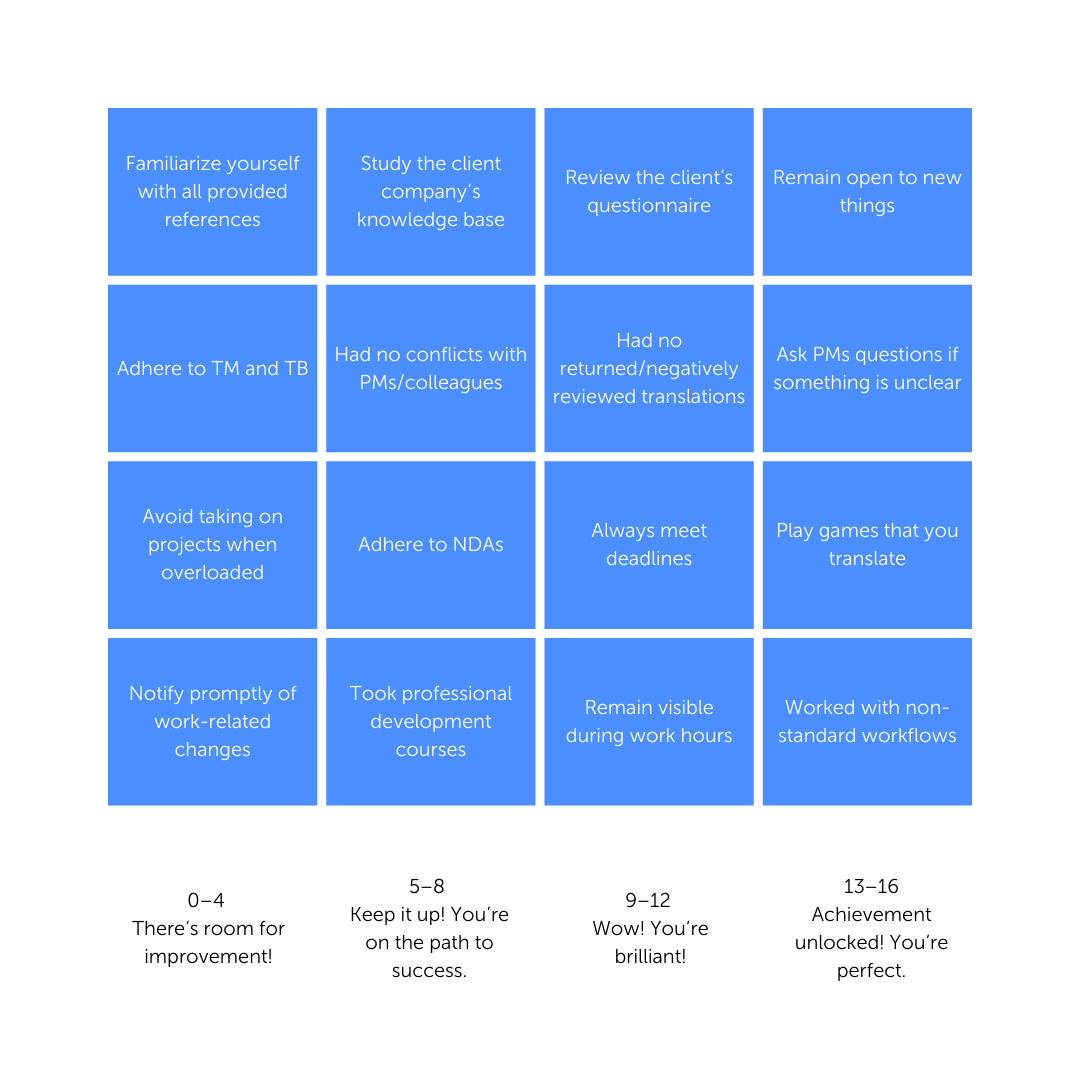Our recruiter, Alina Sekamova, shares insights on the qualities a game translator needs to achieve success in their career. Spoiler alert: translation skills alone are not enough!
When reviewing a translator’s resume or profile and interacting with them, you sometimes think, “Yes, here’s our perfect candidate!” What makes a recruiter think this way about a professional?
Professional qualifications and experience
First and foremost, recruiters look at your education. Ideally, a candidate should have a higher education degree (BA or MA) in Philology or Linguistics, with a focus on translation and/or intercultural communication. Completion of courses on the fundamentals of game localization will reassure the recruiter that you are knowledgeable in the field.
If you lack the education, you can also share certificates of requalification or other relevant courses to prove your expertise.
And, of course, your professionalism is best demonstrated by the projects you have worked on in the past. By the way, we’ve already written about what you can and should include in your resume to market yourself effectively.
Responsibility
Responsibility is difficult to trace during the resume screening stage, but as soon as recruiters initiate contact, all becomes clear: whether the candidate arrives for the interview on time, whether they complete the test in full and on time, and whether they send the required file without any mix-ups. All of this is analyzed by the hiring manager.
The most crucial quality that project managers desire is the ability to meet deadlines. You can ask any project manager from any translation company in the world to share what frustrates them the most in their work, and in 90% of cases, the top answer on their list would be “missed deadlines.” A translator, when agreeing to take on a job, should not unexpectedly vanish from the radar.
Look at the situation through the eyes of a manager: the client is expecting a complete set of files (across 17 language pairs) by 2 p.m. CET today, and the translator for one of the pairs has unexpectedly disappeared and is not responding. It’s 1:26 p.m., and the manager’s eye starts to twitch rhythmically. Do you think the manager would turn to that translator again?
Ability to thoughtfully analyze information
This quality allows a translator to produce a polished and native text, ideally one that doesn’t sound like a translation at all. Attentive, careful, and thoughtful work is what defines you as a professional. Using the norms of the target language, cultural adaptation (where needed and appropriate), analysis of the source text, and the ability to identify and address translation complexities at various levels distinguish those who can rightfully be called localization heroes.
How can a translator demonstrate the ability to thoughtfully analyze information? Recruiters will grasp this through comments and questions in the client questionnaire, as well as messages that the linguist sends to the manager while working on a project.
Professionalism
The professionalism of a linguist will most often be shown in the following:
- Observes norms of business etiquette.
- Calmly accepts feedback on returns or negatives from reviewers or clients and avoids making the same mistakes in the future.
- Responds thoughtfully and substantively to constructive criticism.
- Adheres to signed NDAs (non-disclosure agreements).
- Asks questions when encountering a disputed or unclear situation.
- Maintains communication with project managers during a project.
- Recognizes the need for high-quality work.
- Notifies managers if overloaded with work and unable to take on new projects, showing a concern for deadlines and translation quality.
- Timely communicates changes in their status (updating resume, rate adjustments, leaving the profession, temporary suspension of activity).
- Handles their work with care.
We admire linguists who adhere to all these rules—fortunately, most of our team members do!
Passion for the craft
We always respond with special enthusiasm to cover letters where translators write that their love for games brought them into the world of localization. When a person is passionate about what they do, everyone benefits: the translator, because they are engaged in something that is interesting and important to them; players, because they receive a quality translation with a piece of the translator’s soul; the industry itself, as it is developed by all those involved in gaming. We always ask our translators about their preferences: what games they enjoy playing and what genres they like to translate. An action RPG, for example, is best localized by someone who has spent many hours exploring and enjoying games in that genre.
We invite you to engage in the Perfect Game Translator Bingo. Count how many boxes you can check off, and use the scoring scale to evaluate the results.

What kind of translator are you?



